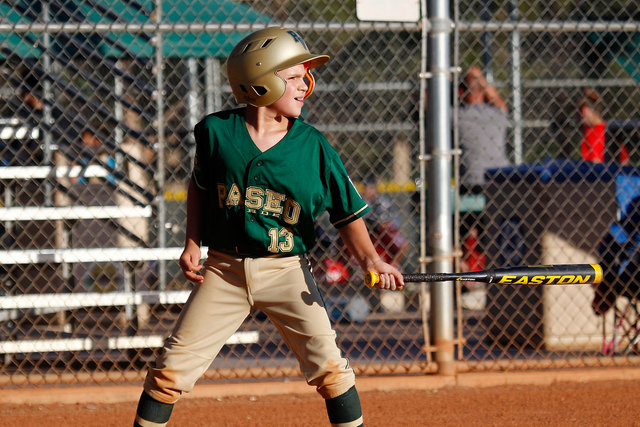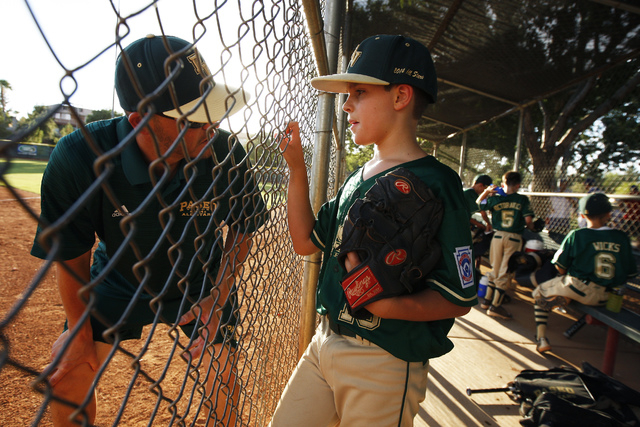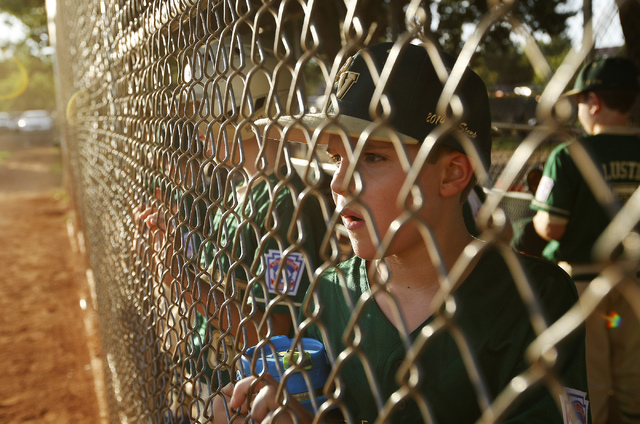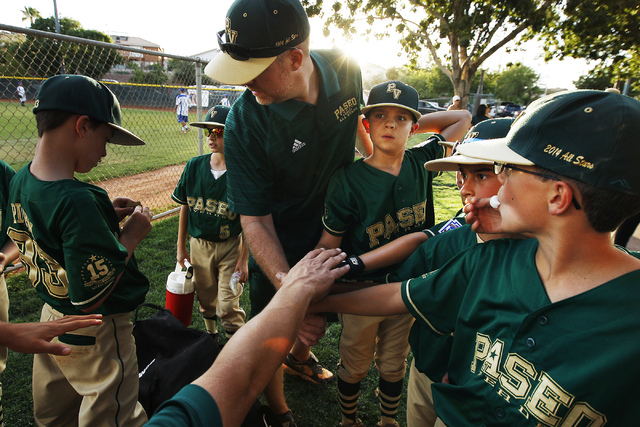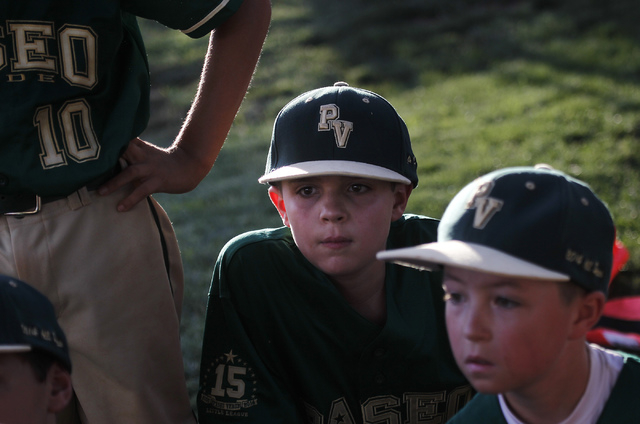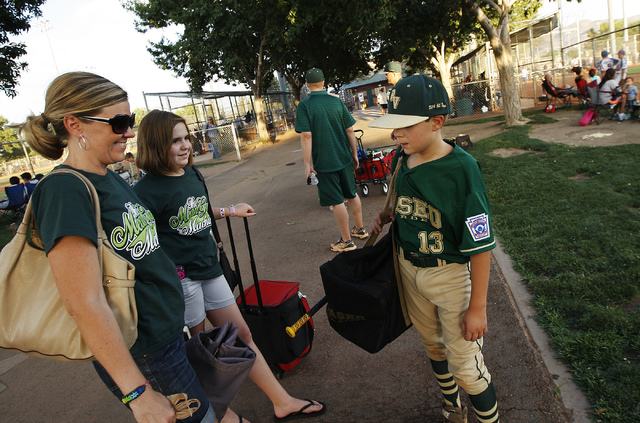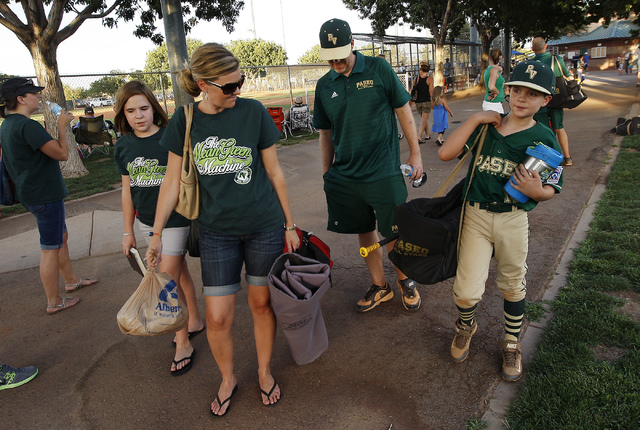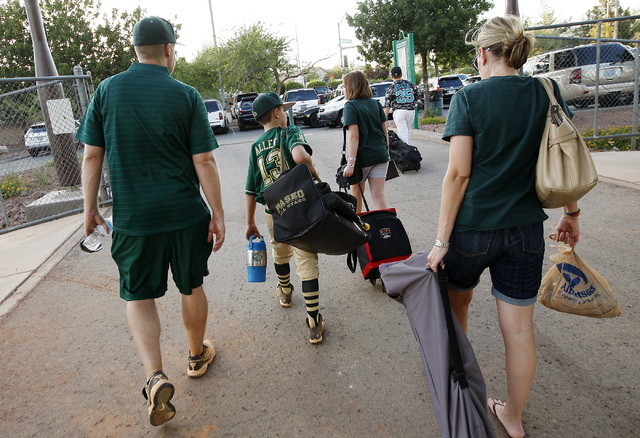Clean base hit is tangible triumph for autistic boy
“Through the blur, I wondered if I was alone or if other parents felt the same way I did — that everything involving our children was painful in some way. The emotions, whether they were joy, sorrow, love or pride, were so deep and sharp that in the end they left you raw, exposed and yes, in pain. The human heart was not designed to beat outside the human body and yet, each child represented just that — a parent’s heart bared, beating forever outside its chest.”
— Debra Ginsberg, author of “Raising Blaze: A Mother and Son’s Long, Strange Journey into Autism”
The diagnosis was simple and yet agonizing, straightforward and yet harrowing: That he would never experience empathy or understand when his parents told him that he was loved; that he would never comprehend emotion; that he would never play a team sport, never have the desire to compete or know the thrill of victory; that he would never enjoy the wholesome and thrilling moment of wearing a baseball uniform and standing on a field.
That he would never be the son they dreamed about; that the journey would be far more treacherous than imagined.
But that’s the thing about angels.
They not only protect and guide and support.
They believe in things others deem impossible.
It was a base hit to right field. A clean, two-hop single on the first pitch of an All-Star season. Or the second. Or the fourth. Or, how about it doesn’t matter? In the most uncomplicated and purest form that is the swing of a Little Leaguer, Daniel Allen’s excursion through the autism spectrum had triumphed in a way that brought grown men and women to an emotional apex they never allowed themselves to visualize.
“It was a moment of reality for all of us,” said D.J., Daniel’s father, of his 11-year-old son’s hit this season on his first All-Star at-bat. “He had won. He was never supposed to be there. Never supposed to have that moment. It was a win for everyone that has been on his journey.
“We want to tell Daniel’s story because we want more than anything for others to take hope from it. One of the biggest things about a diagnosis on the autism spectrum is people won’t embrace it for fear their child will be labeled and judged. Everyone has their own potential. Every journey is different. But this is about getting the resources as early as possible, reaching in and grabbing them and helping your child maximize that potential. Embrace it.
“No matter what happened — if Daniel was going to live with us forever, if he was never going to play team sports, if he was never going to say ‘I love you’ — we’d get over it. He is our son, and that special connection was already there.”
This is a story about faith and perseverance and love, about a mother who quit her career to focus on her son’s development, about a father who overcame the initial sadness of accepting his son might never play sports, about an older sister and a few incredible youth coaches and a local college basketball program that all played major roles in making the voyage a successful one, about a little boy who has defied the odds and is stronger for it, about angels doing work.
It is a story about helping others better understand the neurodevelopment disorder that is autism, characterized by impaired social interaction, verbal and nonverbal communication and by restricted and repetitive behavior.
The line that leads to Daniel Allen as a member of the Paseo Verde Green All-Star team in the 9- and 10-year-old division points directly to his mother, Stacey, who upon his autism diagnosis at age 3 left her job as a high school teacher and set aside plans on earning a master’s degree in administration and one day becoming a principal. She forfeited her dream to focus on fighting the fight with Daniel.
To winning the battle.
They did so together for years, for 60 hours a week, for every second of every minute of every hour of every day, through testing and therapy and treatment and education and tears and doubt.
“You have to throw yourself into it and become your own expert to figure out what is right for your child,” Stacey said. “Daniel fought back. The life he has now is never the life we thought he could have. It takes an incredible amount of faith. There is no telling what the outcome will be for every child. There is no official cure. When you are on the spectrum, you will be somewhere on it the rest of your life. But he has moved along very fast. He does well in school. He is fully mainstreamed. People who meet him now would have no idea.”
Most little boys love to play with footballs and baseballs and basketballs and soccer balls, anything they can throw or catch or shoot or bounce or kick. Daniel never did, not until one day when he was 5, when from one room of the house his parents heard this: “Three-point goal, Wink Adams!”
He had been exposed to UNLV basketball from the beginning, his father having co-authored a book with former Rebels coach Lon Kruger and then later having worked for athletics through the Thomas &Mack Center from 2008 to 2013.
The love of sports began with Daniel mimicking Adams, a former UNLV player, by shooting at a mini-hoop in that middle room. The lights on the game fascinated him. They reminded him of the pregame fireworks at the Thomas &Mack.
He would shoot and shoot and shoot, that repetitive behavior along the spectrum. Baseball was different, though. More difficult. In need of using more fine motor skills. It wasn’t good at first. It was painstakingly slow. He couldn’t catch a ball at age 7. He was so far behind.
But for all the negative examples of youth coaching, all the nightmarish stories of those adults living vicariously through children, there are remarkable people like Mike McDougal, a Little League coach who for three seasons refused to give up on Daniel, who challenged him, believed in him, nurtured him, worked with him, led him down a path that eventually resulted in an All-Star selection.
There is Dan Wicks, his coach this season and now in All-Stars who never treated Daniel like anyone but another good player; there is Joe Graziano, president of Paseo Verde Little League, who implored the Allens to tell their son’s story for the impact it has had on so many.
There is older sister Bailey, who has played an incredibly significant part in her brother’s journey; there is the Dave Rice Foundation, founded by the UNLV basketball coach and his wife, Mindy, and dedicated to the education and support of health initiatives for disorders such as autism.
Angels, you see, come in different shapes and sizes.
“If this is his athletic (summit), I will take it in a heartbeat,” said D.J., an assistant coach on the All-Star team. “Nothing is guaranteed. I’d be lying if I told you my All-Star experience isn’t different from every other parent or coach. Not better. Not more important. But different. Amazing. If he never makes another All-Star team or just continues to play for fun, we are so blessed.
“I was crushed at first when hearing (the diagnosis). But then you quickly begin to have perspective. This has taught our family so much about life. How we looked at others, at ourselves. We stopped judging people. All we wanted for Daniel was to maximize his potential, beginning with communicating and later hoping he’d be able to function. Now, he wants to grow up and be a coach. Can you believe that?”
The soon-to-be sixth-grader has done what all boys do, which is take the paper from a straw and placed it across his lips. He is trying to make his 13-year-old sister laugh by blowing on it. She does.
Their inseparable bond is obvious, siblings having connected through the mystery of a disorder whose hallmark feature is impaired social interaction.
The boy with the paper from a straw on his lip is interacting quite well.
“I don’t feel any different,” said the Little League All-Star, who pitches and plays third base and outfield. “I feel like a normal kid. But I think it’s important to talk about it so others can help their children, so they can learn from it and embrace it.”
The angels did their work.
Faith won again.
Las Vegas Review-Journal sports columnist Ed Graney can be reached at egraney@reviewjournal.com or 702-383-4618. He can be heard from 11 a.m. to 2 p.m. Monday through Friday on “Gridlock,” ESPN 1100 and 98.9 FM. Follow him on Twitter: @edgraney.



